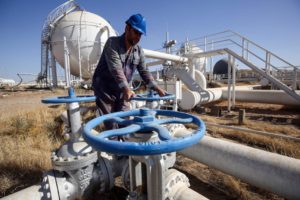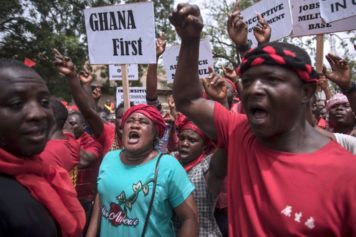
Unbeknownst to many attendees, the mission of the event itself was anything but holy. Part of a well-funded propaganda campaign, the concert was sponsored by Fueling US Forward, a fossil fuel advocacy group supported by Koch Industries, and included an intermission panel with industry lobbyists promoting an increased reliance on fossil fuels and such giveaways as the paying-off of attendees’ power bills. The event was an underhanded way to minimize potential resistance in the area to the proposed construction of the Atlantic Coast Pipeline, a joint venture involving Richmond-based Dominion Energy and several other companies, which would pose a slew of environmental hazards to a number of Virginia’s African-American communities. The massive project, which will connect the pipeline to existing ones, claims to provide “lower-cost supplies of natural gas to generate cleaner electricity, heat the homes of a growing population and power new industries like manufacturing.”
But some area residents know a false prophet when they see one.
“We’re dealing with environmental injustice because here in the Union Hill communities it’s predominantly Black,” said John Laury, a native of Buckingham who raises cattle on his scenic 98-acre farm. “They anticipated choosing us here in a predominantly Black area because they anticipated the least resistance. But they have received more resistance than they had anticipated.”
In December, a year after the Koch-backed gospel event, local residents like Laury were among hundreds, including a statewide coalition of 30 environmental groups, participating in the “Water Is Life Rally & Concert” to protest the proposed pipeline with the slogan “Water is life. Protect it.” The coalition demonstrated in downtown Richmond before marching from the Capitol Square Bell Tower to the National Theatre, emphasizing the need to fight the pipeline while protecting the environment and those who dwell within it.
“I’m not just going to sit down and roll over and let them walk all over us,” offered Ruby Laury, John’s wife, stressing that “people that have lived here have worked all of their lives to have this property to hand it down to their children and to their grandchildren. We have a heritage here.”
Far from coincidentally, the local communities most affected by the proposed project are African-American. The town of Union Hill was founded by formerly enslaved Africans after the Civil War, and many of their descendants still live there today in a community with scenic mountain-rimmed lands, two historic Black churches and an unmarked cemetery containing the remains of 19th-century enslaved Africans and freedmen as well as the recently deceased. Within a one-mile radius of the 68-acre plot purchased by Dominion to host the proposed 54,000-horsepower compressor station, 85 percent of the population is African-American. It is common for communities surrounding such facilities to suffer a sharp increase in a variety of chronic respiratory ailments including asthma and emphysema as a result.
Critics also point to the potential yet well-documented hazards the pipeline poses to the residents, property values, wildlife and ecology of the rural areas in its path. In fact, the U.S. Forest Service had already denied a previous proposal to place the compressor station on national forest land due to the threat it posed to area wildlife. Such stations, which run nonstop to propel the flow of gas through the pipeline, are serious risks for leaks and explosions while rivaling the noise of an airplane. They regularly release toxic chemicals into the air, including nitrogen oxides and methane emissions, a potential harm to all forms of natural life for miles of the fertile green regions and forests drawing from tributaries of Virginia’s James River.
Still, some are focused on a different bottom line. “The Atlantic Coast Pipeline is a transformational project for our region,” stated Dominion Energy in a September 2015 release. “It will create thousands of construction jobs during development and significant new revenue for state and local governments throughout North Carolina, Virginia and West Virginia. The expanded source of gas will also help fuel economic development across the region as businesses and homes rely more on natural gas.”
In their attempt to sell the pipeline to an African-American consumer base, Fueling US Forward relied upon propaganda and vast sums of money from Koch Industries for a campaign that included area gospel concerts, cosponsored events with Black media powerhouse Radio One/Urban One, and with Reaching America, a nonprofit founded by Derrick Hollie, a marketing consultant affiliated with the Black conservative network Project 21. The organization also cosponsored the National Black Political Convention in 2016, where recommendations adopted by delegates presented that “policies that subsidize electric vehicles and solar panels for the wealthy raise energy prices and harm the black community.”
“We’ve done a terrible job in working with individual communities, working with the minority communities on how important energy is to them,” offered Charles Drevna, president of Fueling US Forward and former petroleum industry lobbyist, in a 2016 Facebook Live chat. “And who gets hit the hardest when there’s a spike in energy costs? They get hit the most, and they get hit the hardest.”
Some aren’t buying it. Angered by the Koch-backed gospel event blaring from her radio in 2016, the Rev. Faith Harris, an environmental activist at historically Black Virginia Union University in Richmond, called the radio station to challenge the DJ’s stoking of listeners to consider the need for an increased reliance on fossil fuels.
“I called the radio station to ask, ‘How could you do that?” Harris told Grist magazine. “The debate isn’t whether there are enough fossil fuels, but about the health and environmental impact they have on the way we live on this planet.” Harris and other pastors and activists would proceed to inform their congregations and local residents about Fueling US Forward’s underhanded tactics while rallying their communities against the pipeline. The Koch-backed organization ceased functioning publicly last year.
But the proposed Atlantic Coast Pipeline project remains, although currently a year behind schedule and facing a less certain future given Democrats, traditionally more environmentally conscious, won seats in the House of Delegates in the last statewide election cycle. A number of bills have been introduced to require pipeline operators to obtain more permits before beginning any work. And in nearby North Carolina, a federal judge recently barred the pipeline project from clearing trees on two private properties.
Meanwhile, protesters in Virginia, growing in number and size, aren’t backing down from challenging what many believe to be an unholy attack on their lands and their lives.
“We in the church community have a moral responsibility to be out-front on protecting our flock from climate change,” Harris told Grist, noting “I call it an authentic pro-life agenda.” The Christian church, insisted Harris, “for too long, has allowed ‘pro-life’ to be defined solely as conception when, in fact, life is much more complex. It includes our quality of life while we’re here.”


